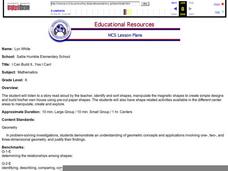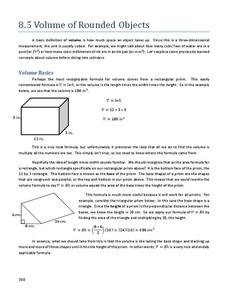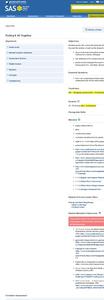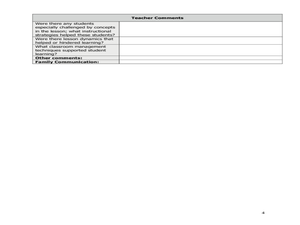Curated OER
I've Seen That Shape Before
Students identify geometric solids. In this shape lesson, students explore the characteristics of geometric solids. They locate pictures of shapes on the internet, and identify the shapes. Students draw pictures of shapes, take...
Curated OER
Shapes Around Us
Students create posters about geometric shapes in order to demonstrate their understanding of the different shapes. Students look for pictures in magazines to represent two-dimensional shapes, paste them on a poster, label the shape,...
Teach Engineering
Seeing All Sides: Orthographic Drawing
How can your draw three-dimensional figures on paper? The lesson shows pupils how to draw orthographic projections of three-dimensional figures composed of cubes. After viewing a PowerPoint presentation, they practice this skill with...
Curated OER
Soft Sculpture Birds
Art can mimic life, and animals are always interesting subjects. Learners create large soft sculptures (stuffed) birds using paper, paint, and other basic collage materials. They view images of birds, and discuss bird traits and shapes....
Radford University
Koi Pond
There's nothing fishy about the activity. Future mathematicians design a koi pond from various three-dimensional shapes. They calculate the perimeter, area, and volume of the pond, and then create PowerPoint presentations. They also...
Curated OER
Three-Dimensional Ceramic Sculptural Forms Inspired by the Paintings of Wassily Kandinsky
Students analyze / deconstruct elements of design used in Wassily Kandinsky's paintings in order to synthesize the elements into a three-dimensional form. Works may be functional or non-functional.
Curated OER
Shape & Form
Pupils analyze the difference between shape and form. They identify, explain and use the basic elements of design and determine that forms are three-dimensional and shapes are two-dimensional. They sketch it on their paper and then...
Curated OER
Line and Shading = Shape and Form
Students collect natural objects and draw these objects with and without shading.
Curated OER
I Can Build It.....Yes I Can!
Kindergartners listen to a story read by their teacher, then use magnetic shape pieces to construct simple designes. They "build" their own house using pre-cut paper shapes. This age-appropriate lesson plan would be an excellent choice...
Alabama Learning Exchange
Twisted Tangrams
Primary geometers create a picture using tangrams. In this geometry lesson, learners read Grandfather Tang: A Tale Told with Tangrams, cut out their own tangrams, and choose a character from the story to make using their tangram pieces.
Charleston School District
Volume of Rounded Objects
How much can different shapes hold? The answer varies depending on the shape and dimensions. Individuals learn the formulas for the volume of a sphere, cone, and cylinder. They apply the formulas to find the volume of these...
Curated OER
Copy Cat
Students examine a Webmath page, and demonstrate how to copy and paste. They create a computer-generated template page presenting the attributes of two- and three- dimensional shapes.
Curated OER
Putting It All Together
Students complete activities to learn about the shapes and their vertices. In this shape recognition instructional activity, students discover the rule linking the number of sides with the number of vertices for shapes. Students...
Futures Channel
Folding Circles
Students investigate properties of circles. In this geometry lesson, students differentiate between similarity and congruence as they observe polygons. They investigate properties of two and three dimensional shape.
Ohio Department of Education
Describing and Creating Plane Figures - Grade One
Young mathematicians draw, create, and describe different shapes using triangles. They discuss attributes of the original and created shapes. Pupils classify the created shapes and draw and write in mathematics journals to communicate...
National Gallery of Canada
My Treehouse
If you could build your own treehouse, what would it look like? Using a piece of contemporary art as inspiration, learners draw their own treehouses and add geometric and organic shapes. The lesson touches on Visual Thinking Strategies...
Radford University
Swimming Pool Dilemma
Different shape, same volume—that's quite a challenge! Scholars design a pool for an imaginary client using three-dimensional figures. They must then create a second pool for another client with the same volume, but using different shapes.
Curated OER
Cutting Corners
Second graders examine two-dimensional shapes using their characteristics. In this shapes lesson, 2nd graders identify similarities and differences by using cut out shapes, diagrams, mirrors, and graphic organizers.
Pennsylvania Department of Education
Creating Polygons
Students describe, make and compare polygons. In this creating polygons lesson, students identify properties of quadrilaterals and describe common features of two dimensional shapes.
Curated OER
Classifying Triangles Based On Properties of Angles
The interactive lesson featured here calls for the use of a Smartboard for sorting and classifying shapes. Then, pupils discuss the rules they followed for sorting their shapes, particularly focusing on the properties of angles. While...
Curated OER
Symmetry in Relief
Students explore radial symmetry. In this 3 dimensional art and geometry lesson, students identify examples of radial symmetry in everyday objects. Students create an imprint using radial symmetry on clay tiles.
Utah Education Network (UEN)
Candies R Us
A box is fun to make, especially when it's a candy box! These activities help to cement understanding of the difference between surface area and volume. Have individuals measure the surface area of their box in two-dimensions before...
Technical Sketching
Introduction — Surfaces and Edges
How different can 3-D and 2-D really be? An engineering resource provides an explanation about the importance of two-dimensional technical drawings. Several samples show how to create multi-view drawings from pictorials and vice-versa....
National Security Agency
Awesome Area - Geometry and Measurement
Break out those math manipulatives, it's time to teach about area! Capturing the engagement of young mathematicians, this three-activity series supports children with learning how to measure the area of squares, rectangles, and other...

























